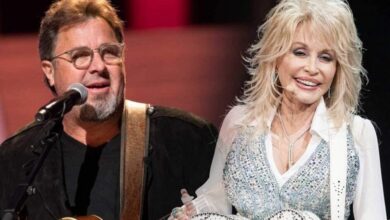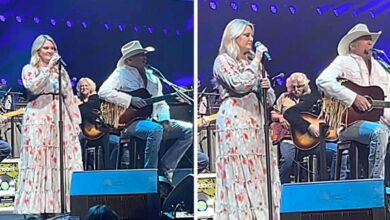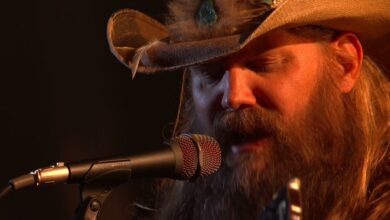Eddy Arnold And LeAnn Rimes Showcased An Impressive Yodeling Duel During Their “Cattle Call” Performance
Eddy Arnold, born on May 15, 1918, in Henderson, Tennessee, emerged as a pioneer in country music, known for his smooth baritone and ability to convey deep emotion through song. Growing up in a rural environment, Arnold developed a love for music at an early age, influenced by the sounds of the South. He later moved to Nashville, which would become the heart of his musical career. He began performing on the Grand Ole Opry, a platform that showcased him to a broader audience and solidified his status as a favorite among country music fans. Arnold’s charming presence and his knack for storytelling through song resonated with listeners, allowing him to build a lasting legacy in the music industry.
Arnold’s career spanned over six decades, where he recorded more than 500 songs and achieved an impressive 147 charted hits on Billboard Country charts. His success is particularly notable because it came during a time when country music was still in its formative years, vying for respect and a solid fan base amidst a changing musical landscape. In the late 1940s and 1950s, Arnold began to introduce pop elements into his music, creating a crossover appeal that attracted not only country fans but also those from the pop genre. This strategic blending of styles not only distinguished him from his contemporaries but also set a precedent for the evolution of country music.
One of his most celebrated songs, “Cattle Call,” encapsulates the essence of Arnold’s musical style. With its distinctive yodeling and vivid imagery, “Cattle Call” is a perfect representation of the joyful spirit that characterized Arnold’s music. The song speaks to the life of cattle herders, portraying their connection to the land and animals. Arnold’s talents allowed him to infuse a sense of whimsy into what could have been a straightforward narrative. The catchy refrain stands out, showcasing both his vocal ability and storytelling prowess, inviting listeners to visualize the pastoral scenes he describes.
The cultural impact of “Cattle Call” extends beyond just the music itself. It taps into the rich tapestry of Americana, exploring themes of independence, hard work, and the cowboy lifestyle. This lifestyle has been a source of fascination in American culture, symbolizing freedom and the rugged experience of life in rural America. By engaging these themes, Arnold was able to create music that resonated on a deeper level with listeners, evoking nostalgia and a longing for simpler times characterized by wide-open spaces and a close connection to nature.
Furthermore, the incorporation of yodeling in “Cattle Call” highlights Arnold’s ability to embrace and blend various musical traditions. Yodeling itself, with roots in Swiss folk music, had found a place within American country and western music, demonstrating the genre’s capacity to evolve and adapt. Arnold’s seamless integration of yodeling into the narrative of a cowboy’s life illustrates how diverse cultural influences can converge to create a uniquely American sound. This blending of influences is a hallmark of country music, and Arnold’s work exemplifies how artists can honor those traditions while also pushing the genre forward.
The song’s accessibility and infectious energy made it popular in various forms of media over the years, further embedding it in the cultural consciousness. Its appearance in films, television shows, and commercials speaks to its relevance and adaptability, allowing it to reach new audiences even decades after its release. The nostalgic themes and lively melody continue to evoke images of adventure and the spirit of the West, securing “Cattle Call” a timeless position within the musical canon.
Artistically, Eddy Arnold’s influence is profound, inspiring subsequent generations of musicians. Icons such as George Jones, Merle Haggard, and Keith Urban have all cited Arnold as an essential figure in their musical development. His blend of storytelling and melodic structure laid a foundation for artists who later sought to explore their own innovative paths, demonstrating how Arnold’s legacy extends well beyond his own recordings. This generational impact highlights the importance of preserving musical traditions while also encouraging new interpretations.
The song “Cattle Call” embodies Arnold’s ability to create music that celebrates the stories of everyday life. It serves as a reminder of the resilience, joy, and challenges faced by those in rural communities. The song’s narrative continues to resonate, illustrating how the experiences of human life can be shared and appreciated through song. This universal connection is what allows music to transcend cultural and geographic boundaries, appealing to listeners from diverse backgrounds.
In conclusion, Eddy Arnold’s contributions to music extend far beyond chart statistics. He played a significant role in shaping the landscape of country music, blending genres and introducing softer sounds that appealed to a wider audience. His artistry, exemplified in songs like “Cattle Call,” reminds us of the importance of storytelling in music and the power it has to connect people. As country music evolves, the foundations laid by artists like Arnold are ever-important, ensuring that the genre remains rooted in the stories and experiences that define the American spirit.





